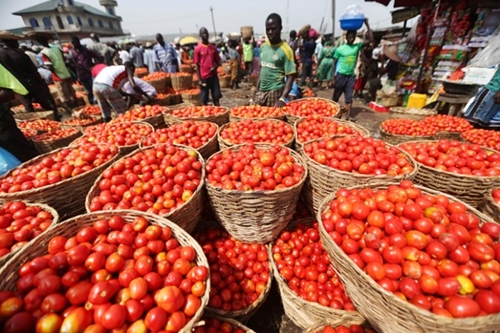Hot Stories

Recent Stories
Investigative Report: Scarcity of Tomato Hits Abuja, Nasarawa Markets...See Details
Posted by Odinaka on Tue 23rd May, 2017 - tori.ngA recent investigation by News Agency of Nigeria (NAN) at the federal capital territory, Abuja, revealed that tomato which is a major ingredient of most foods, in Nigeria, is now scarce.

File photo
Consumers in Abuja and some parts of Nasarawa State have, for a while now, been experiencing scarcity of tomato and high cost of pepper in various markets.
A recent investigation by News Agency of Nigeria (NAN) at Wuse, Gosa, Utako, Deidei and Garki markets in Abuja revealed that apart from the excessive cost of tomato in the markets, the produce was also very scarce.
A visit to Orange market, a major tomato market in Mararaba, Nasarawa State, revealed a 200-per-cent increase in the price of tomato and a 100-per-cent increase in the price of pepper.
Malam Idris Danbaushi, a tomato seller at Garki market, said that the price of a medium-sized basket of tomato was now N2,500, as against its former price of N800 to N900, barely a week ago.
“Ten pieces of tomato now cost between N300 and N350, while a small bowl of pepper now costs N200, as against its N100 price tag a couple of weeks ago,’’ he said.
An official of Tomato Sellers Association at Orange Market, Mararaba, who spoke to NAN on condition of anonymity, debunked the speculations that the scarcity of tomato was due to the resurgence of Tuta Absoluta, a tomato pest which ravaged many tomato farms last year.
In actual fact, researchers have warned that Tuta Absoluta could be very difficult to control because of its high mutation capacity, while it has a strong potential to develop resistance to insecticides.
The official said that apart from the impact of the tomato disease on farms, climate change was also having devastating effects on tomato farms and farmlands across the country.
He, nonetheless, conceded that the current scarcity of tomato was unusual because there was no place in the northern parts of the country that was experiencing flood at the moment.
He, therefore, blamed the current tomato scarcity on production shortfalls in dry-season tomato farming in Jigawa, Katsina, Zamfara, Sokoto, Kaduna, Bauchi, Gombe, Taraba and Kano states.
“These states alone produce over 60 per cent of tomato in commercial cultivation. It is logical that the scarcity of any product will always drive up prices; that is what is we are all experiencing now with regard to tomato and whenever it completes its cycle, things will return to normalcy.
“You can now count the number of trailers that bring in tomato; some weeks ago, we used to offload tomato from more than 15 vehicles during the week and over 20 vehicles at the weekend. Nowadays, this has significantly reduced to only 10 trailers in the entire week."
One of the tomato marketers, Malam Aminu Dangosa, however, said that the Boko Haram insurgency had made it extremely difficult for farmers in the North East to cultivate tomato and other crops.
“The little tomato we are buying now is being produced by states in the middle-belt area of the country; we have to rely on tomato from these states until the rainy season stabilised.
“There is also same problem with pepper and what is cheap now is onion because its storage system is good," he said.
Dangosa said that the price of a big basket of tomato was between N15, 000 and N25, 000 at the moment. “I can assure you that when the off-season begins, the same basket of tomato may cost more than N30,000,’’ he said.
He also blamed the high cost and scarcity of tomato in the market on the dearth of tomato processing industries in the country, adding that the available ones were operating below installed capacity. “That is why during the off-season, most Nigerians go for locally dried pepper and tomato," he said.
Another marketer, Alhaji Salisu Idris, said that by and large, the country was facing unprecedented food security challenges. He said aside from the scarcity of tomato, food merchants from neighbouring countries had invaded Nigerian markets, buying up grains, vegetables and other produce.
“Some unpatriotic Nigerian serve as agents for these food merchants and they buy up produce from farmers; they also fund the crop growing of some farmers and take the harvests across the border at night," he said.
Besides, Salisu said that the tomato glut, experienced some months back in some tomato producing states, had made some farmers to back out of the business, while the activities of the middlemen had not helped matters.
“The middlemen always overcharge the trailer drivers and in the process, most farmers will prefer to sell their tomato to local buyers," he said.
Malam Abdullahi Adamu, who is also a marketer, noted that the protracted Boko Haram insurgency was another major problem, as citizens of Niger Republic were now buying up available produce in Nigerian markets.
He said that it had become somewhat difficult for the nationals of Niger Republic to have access to the markets in Yobe and Borno states from the north-eastern axis because of the insurgency in the area.
“Their focus is now on Katsina, Sokoto, Kano and Jigawa states because the states share borders Niger Republic in the north-western axis and the porous nature of our country’s borders has made it easy for the Nigeriens to come in at will."
Top Stories
Popular Stories
Stories from this Category
Recent Stories



















































